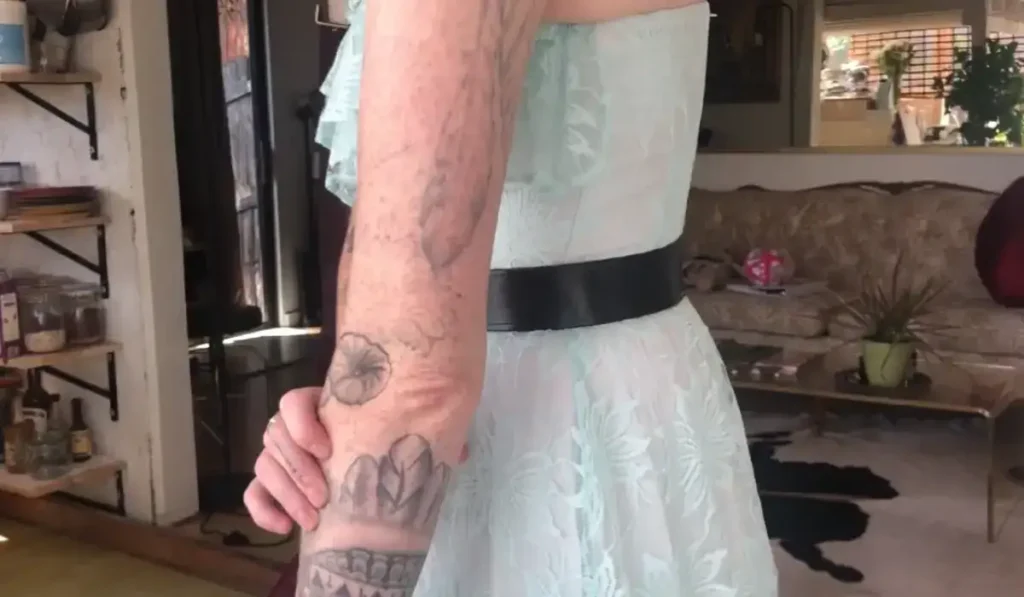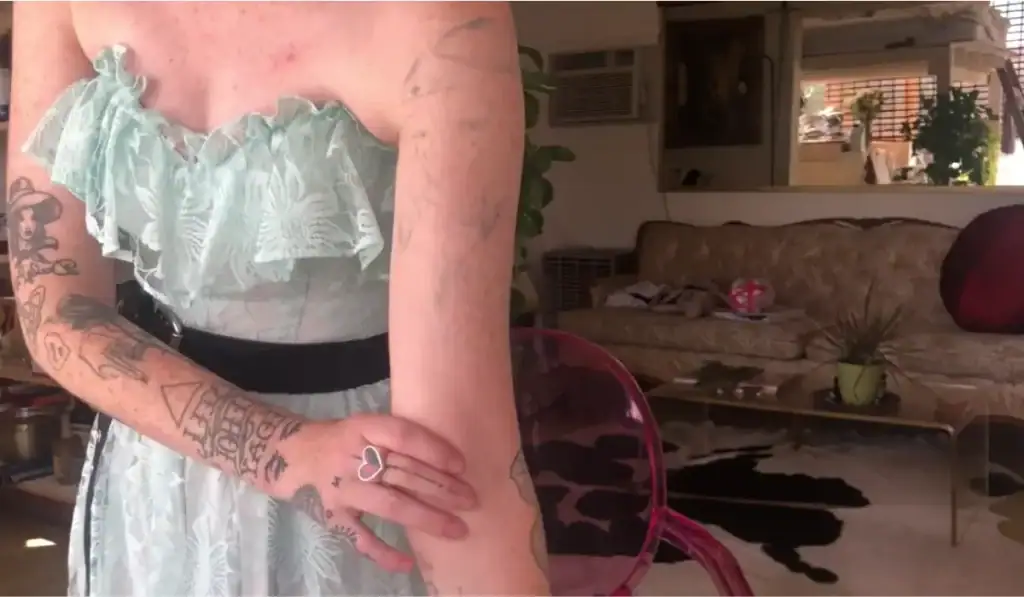How to Fade a Tattoo: Safe & Effective Methods (at Home!)
Fading an unwanted tattoo takes time and the right approach. At the same time, a professional laser tattoo removal service is the most effective method. However, many look for safe and affordable ways to remove their tattoos at home.
These methods often use natural or chemical agents that penetrate the skin and gradually break down the ink pigments. It’s important to note that at-home methods may take weeks or months to show results and work better for some tattoo ink colors than others.
Key Takeaways:
- At-home tattoo fading methods include natural remedies and over-the-counter products.
- Sun exposure, lemon, salt, and scrubs can lighten tattoos, but results vary.
- Professional laser removal remains the most effective but costly solution.
Note: Always consult a dermatologist before trying any skin treatments.
How Does Tattoo Ink Stay in Your Skin?
Before exploring tattoo fading methods, let’s understand how the ink interacts with the skin’s structure. Here’s a detailed breakdown of the science behind tattoo ink and skin layers:
- The Structure of Human Skin
- Epidermis: The outermost layer of the skin that acts as a protective barrier. It constantly protects and renews itself, so ink deposited here would fade quickly.
- Dermis: The middle layer, where tattoo ink is placed. This layer remains stable over time to ensure the longevity of the tattoo. The dermis contains blood vessels, nerves, and collagen fibres, making it an ideal location for ink retention.
- Hypodermis: The deepest layer of the skin, consisting of fat and connective tissues. Ink deposited too deeply into this layer can cause blurring and uneven tattoos.
- How Tattoo Ink Stays in the Skin
- Needle Penetration: Tattoo needles puncture the skin rapidly, depositing ink into the dermis layer. This precise depth ensures the tattoo ink remains visible without excessive fading or spreading.
- Immune System Response: When ink enters the dermis, the body recognizes it as a foreign substance. White blood cells attempt to remove the ink, but the ink particles are too large to eliminate, leading to the ink’s semi-permanent nature.
- Ink Particle Stability: Tattoo inks are made from various pigments suspended in a carrier solution. These particles’ size and chemical composition contribute to how well they stay in place over time.
- Factors Affecting Tattoo Longevity
- Skin Type: Oily or dry skin can influence how well the ink settles and retains color.
- Ink Quality: High-quality inks with stable pigments are less likely to fade or spread.
- Tattoo Technique: Experienced artists ensure the ink is deposited evenly at the correct depth, preventing issues like blowouts or uneven fading.
- Why Tattoos Fade Over Time
- Sun Exposure: UV rays break down ink particles, causing tattoo colors to fade and blur. That’s why you should protect your tattoo from sunlight.
- Skin Regeneration: Although the dermis remains stable, some pigment can migrate or break down as the skin naturally ages.
- Immune System Activity: White blood cells slowly remove ink particles over time, contributing to gradual fading.
How to Fade a Tattoo

Tattoo Fading With Lemon and Salt Mixture
Lemon and salt are often cited as natural agents for fading tattoos. Salt contains sodium and chlorine, which can help exfoliate the skin and remove ink particles over time. Lemon juice is a natural bleaching agent, potentially lightening the tattoo’s appearance.
How to use:
- Mix equal parts lemon juice and salt.
- Soak a cotton ball in the mixture and rub it gently over the tattooed area 2-3 times daily.
- Continue this process for a month to see results.
Important Note: This method may irritate the skin and is generally only effective on black ink tattoos. Always do a patch test first.
Fade Tattoo Ink by Exposing It to Sunlight
According to Dr. Michele S. Green, a board-certified dermatologist, prolonged sun exposure can break down tattoo pigments, causing them to fade. However, UV rays can damage the skin and increase the risk of skin cancer (effect of Sunlight exposure).
Safe sun exposure tips:
- Expose the tattooed area for 10-15 minutes between 10 a.m. and 4 p.m.
- Use sunscreen on the surrounding skin to prevent damage.
- Avoid overexposure, which can lead to sunburn and long-term harm.
Fade Your Tattoo With This 4-Ingredient Remedy.
A mixture of aloe vera, honey, yoghurt, and salt is sometimes used as a natural skin treatment. Though not scientifically proven for tattoo removal, it can help exfoliate and nourish the skin.
How to use:
- Combine equal parts aloe vera, honey, and yoghurt with a tablespoon of salt.
- Cleanse the tattooed area with gentle soap and water.
- Massage the mixture onto the tattooed skin and leave it for 20-30 minutes before rinsing.
- Repeat this procedure daily for gradual results.
Lighten the Ink Appearance With Apricot and Salt Scrub
While there is no scientific evidence that apricot scrubs can fade tattoos, they can exfoliate the skin and remove surface layers, potentially lightening the tattoo’s appearance. Dermatologist Dr Jessica Krant notes that apricot and salt scrubs lack scientific backing for tattoo fading but may still serve as a natural home remedy to lighten ink designs.
How to use:
- Mix apricot scrub with a tablespoon of salt.
- Gently rub the mixture onto the tattooed area for a few minutes.
- Rinse and repeat 2-3 times a week.
Fade Tattoo Using Hydrogen Peroxide
Hydrogen peroxide is a common household antiseptic that some believe helps lighten tattoos. According to Dr Joshua Zeichner, director of cosmetic and clinical research in dermatology, hydrogen peroxide may help fade ink. Still, it’s important to note that hydrogen peroxide is not a scientifically proven method for tattoo removal, and its effectiveness is limited. However, if you want to try it, follow the following instructions.
How to use:
- Soak a cloth in hydrogen peroxide and apply it to the tattooed skin area for 10-15 minutes.
- Rinse the area with water and moisturize afterwards.
- Repeat daily for best results.
Salicylic Acid
Salicylic acid, often found in acne treatments, is a gentle chemical exfoliant. While it doesn’t penetrate deeply enough to remove ink entirely, it may help fade surface layers of tattooed skin.
How to use:
- Purchase a salicylic acid product from a local pharmacy.
- Apply as directed, typically once daily.
- Monitor for irritation and stop using if excessive dryness occurs.
Get Rid of Tattoos With Removal Cream
Commercial tattoo removal creams like Wrecking Balm and Inked Up claim to lighten tattoos. However, the effectiveness of these creams is debated, and results vary.
For a homemade alternative:
- Mix aloe vera gel, two vitamin E capsules, and a tablespoon of tamanu juice.
- Massage the mixture onto the tattooed area and rinse after 20 minutes.
- Use daily for gradual fading.
Professional Tattoo Removing Services
If at-home methods don’t provide the desired results, professional services like laser tattoo removal offer the most effective solution. Laser treatments break down ink particles, naturally allowing the body to clear them over time (Cleveland Clinic).
Professional options:
- Laser removal: The most effective but expensive method.
- Dermabrasion: Removes skin layers, leading to significant fading.
- Surgical removal: Physically excises the tattoo, leaving a scar.
Comparing At-Home and Professional Tattoo Removal Methods
| Factor | At-Home Tattoo Fading | Professional Tattoo Removal |
| Effectiveness | Moderate – results vary; may not completely fade tattoos | High – can significantly fade or completely remove tattoos |
| Cost | Low – uses affordable home remedies or over-the-counter products | High – laser, dermabrasion, and surgical removal are expensive |
| Time Required | Weeks to months for visible results | Faster – results seen after a few sessions, though full removal may take several treatments |
| Safety | Risk of skin irritation, scarring, or infection if not done properly | Safer when performed by certified professionals, though some risks like scarring still exist |
| Pain Level | Mild discomfort depending on the method (scrubs, acids) | Moderate to high pain; numbing creams are often used for laser treatments |
| Skin Type Consideration | May not work well on sensitive skin or darker skin tones | Professionals can adjust treatment according to skin type and tattoo colors |
| Ink Color Effectiveness | Works best on black and dark ink; lighter colors fade slowly | Laser and professional methods work on a broader range of ink colors |
| Risk of Scarring | Higher risk with improper use of chemicals or harsh scrubs | Lower risk when done by experienced professionals |
| Convenience | Done at home on your own schedule | Requires multiple appointments at a clinic |
FAQs
Does lemon juice fade tattoos?
Lemon juice has natural bleaching properties and can help fade tattoos when combined with salt. However, it works best on black ink and requires consistent use over time.
Can you lighten a dark tattoo?
Yes, lemon and salt, sunlight exposure, and tattoo removal creams can lighten dark ink design. But if you want quick results, professional laser treatments remain the most effective solution.
Can laser tattoo removal fade a tattoo instead of completely removing it?
Laser treatments often require multiple sessions, gradually breaking down ink particles and making the ink less visible.
Conclusion
Fading a tattoo at home requires patience and careful consideration of your skin’s health. While natural remedies and over-the-counter products offer affordable options, professional treatments are most effective. Before trying any method, consult a dermatologist to ensure safety and avoid skin damage.

Ava Sinclair
Meet Ava Sinclair, a tattoo artist and writer at Tattoogaze.com. With 7 years of experience, Ava loves tattoos and loves sharing her knowledge. She writes helpful articles about tattoos, from cool designs to how to take care of them. She also guides you on finding the right tattoo machine and explains the cost of getting a tattoo. Let’s create something meaningful together

Ava Sinclair
Meet Ava Sinclair, a tattoo artist and writer at Tattoogaze.com. With 7 years of experience, Ava loves tattoos and loves sharing her knowledge. She writes helpful articles about tattoos, from cool designs to how to take care of them. She also guides you on finding the right tattoo machine and explains the cost of getting a tattoo. Let’s create something meaningful together

